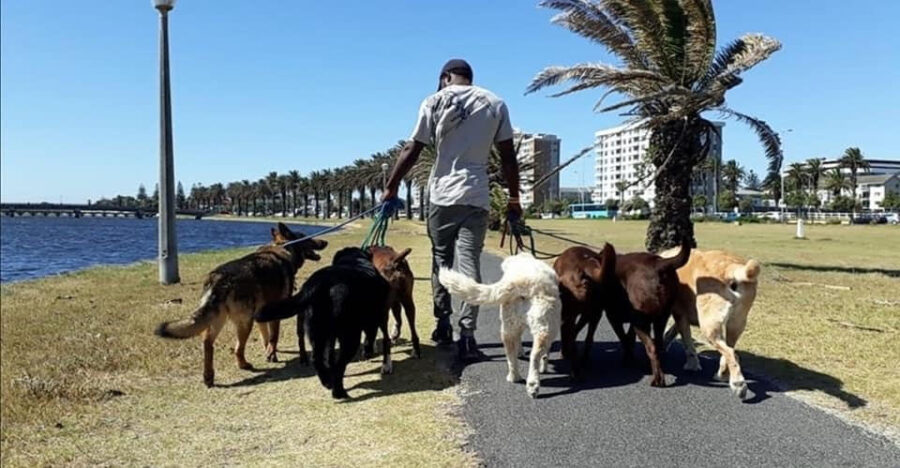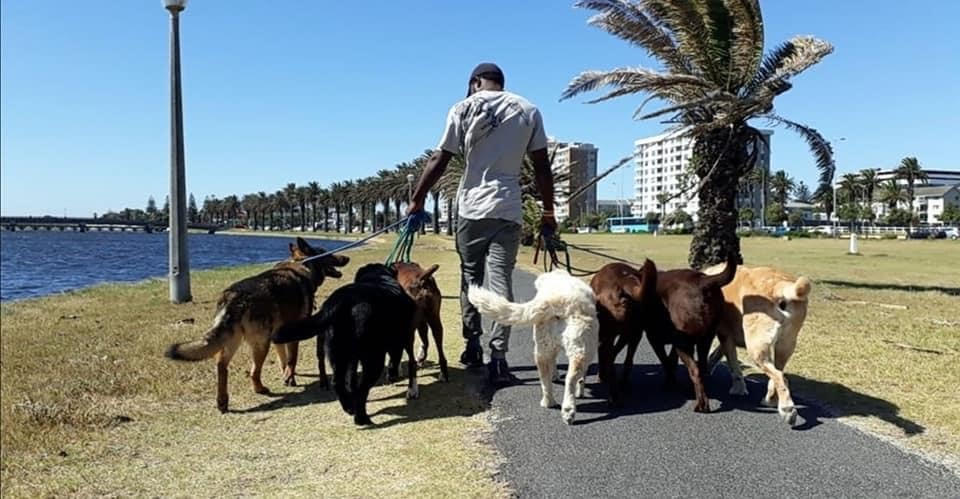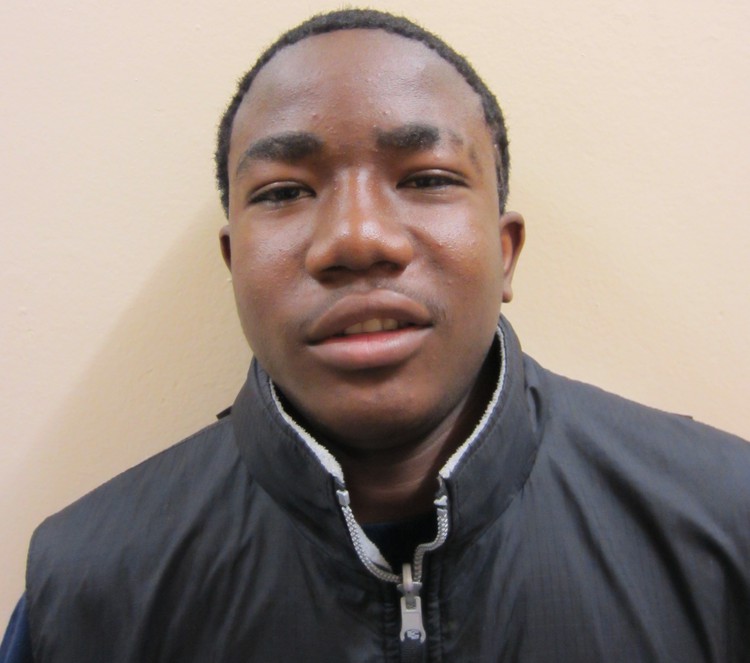
The Tragic Life and Death of Cape Town’s Well Known Dog Whisperer
The dogs he walked would anticipate his arrival and recognise him when he arrived at the gate… writes Kimon de Greef. One dog would “do backflips,” her owner remembers. Others barked and raced around, wagging their tails. The name on his refugee permit was Kevin Ilunga Nkongolo. Many residents of Milnerton knew him as Kevin. […]

The dogs he walked would anticipate his arrival and recognise him when he arrived at the gate… writes Kimon de Greef. One dog would “do backflips,” her owner remembers. Others barked and raced around, wagging their tails.
The name on his refugee permit was Kevin Ilunga Nkongolo. Many residents of Milnerton knew him as Kevin. He was 20 years old, with an athletic build and a smile that stuck in the memories of people who met him.
But what people remembered most of all was the strange and wonderful sight of him walking as many as ten dogs at once, leashes bunched in each hand, through the suburbs and along the footpath at Milnerton lagoon. Kevin would throw sticks for the dogs and allow them to swim. The dogs seemed, incredibly, to obey him always.
Within just a few months, Kevin became a fixture of the neighborhood, and even people who had never met him felt some familiarity with his routine. Joggers stopped and took photographs. Commuting drivers would pass him and wave.
One Wednesday last June, as South Africa’s first lockdowns began to ease, Kevin rang the doorbell of a man in Milnerton and offered his services as a dog walker. The man owned a muscular and spirited Boerboel named Muffin. She was difficult to handle, the owner warned Kevin. Kevin proposed taking her around the block to demonstrate his ability. They set off, the dog bounding and yanking at the leash, and returned minutes later with Muffin walking calmly at heel.
“My jaw literally dropped,” the man recalled recently.
That was one of the last times anyone saw Kevin in Milnerton. The following morning, 4 June, he turned up in Sea Point. In a quiet cul-de-sac he removed his cap and fashioned a noose from a dog leash, which he hitched to a fence post and placed around his neck. Kevin the dog walker was dead within minutes.
Reverend Natalie Angela Barnard, a Presbyterian church minister, was at home that day on Monastery Road in Sea Point when she heard a commotion outside. A security van had pulled up and it appeared as if a man was leaning against the gate. The man’s head was tilted and one knee was bent.
Forensic pathologists arrived to take down the body.
Barnard had never laid eyes on the man. He was a perfect stranger. His expression struck her as peaceful, but he was thin and poorly dressed for winter. He had no jacket. The previous night’s temperature had dropped below 13 degrees.
On the tarmac beside him lay a backpack containing his refugee permit, a notebook, a mobile phone, a C.V. and a bible. There was no food or money. “He looked completely alone,” Barnard said.
Were it not for the documents, as well as the remarkable efforts of Barnard and a friend to investigate them, the man’s story might have ended there — one of South Africa’s many thousands of anonymous dead. But Kevin had a name that would soon reach a massive audience, becoming something close to a parable: the dog whisperer who took his own life. His suicide became an indictment of the treatment of immigrants in a country that routinely shuns and exploits its African neighbours. And during the pandemic, which thrust to the surface so many broken aspects of South African society, Kevin’s story became emblematic of a widening and terrible inequality.
Barnard was long accustomed with the brutal realities of life on Cape Town’s margins. Her congregation is at St Andrew’s Presbyterian Church in Green Point, surrounded by gleaming office blocks and hotels, yet caters mostly to African immigrants. Within 24 hours of the first lockdown, about two-thirds of her congregation had lost their income, she said. Barnard also knew what it meant to encounter the dead, having been called on several times, in her 18 years as a minister, to help identify bodies. But something about the man outside her home affected her more deeply than she expected. She felt a responsibility, she said, to honour his life.
That evening, Barnard recounted what had happened to a South African friend living in England, Karen Louise Fletcher. (Fletcher, 58, had experienced suicide and estrangement within her own family, and the circumstances of Kevin’s death, she told me recently, felt “close to the bone”.) The following morning, Fletcher posted on Facebook about “a young foreign national” who had hanged himself with a dog leash in Sea Point. The post went viral and people began contacting Fletcher with information. She became obsessed with piecing together his story. Who was this man, and what had pushed him over the edge?
Kevin Ilunga was born in 1999 in Lubumbashi, a city of mineral riches and human poverty on the southernmost edge of the Democratic Republic of Congo, close to the border with Zambia. Lubumbashi is the economic and administrative center of the Katanga region, which produces around half the world’s cobalt — used for producing the rechargeable batteries in cellphones and laptops — and enormous quantities of copper. Many people living there are desperate. When Kevin was still an infant, his mother died, and he later went to live with two of her brothers. At about the age of thirteen, Kevin wound up at an orphanage in Benoni, speaking very little English; through a translator, he explained that his uncles had trafficked him to South Africa.
Fletcher traced Kevin back to the orphanage via his refugee permit, where it was listed as his residential address. His file, parts of which I have reviewed with permission, is one of a profoundly traumatised teenager. He was brought to the orphanage a few days after jumping the Zimbabwean border. Men with guns had accosted them somewhere near Johannesburg; Kevin and the driver fled, and the driver was shot in the leg. Kevin ran through a forest until reaching “a place with lights” and being taken to the police. “Kevin is very upset, wants to sit alone,” a social worker wrote on June 4, 2013 — seven years to the day before Kevin took his life in Sea Point. During that interview, Kevin said that he was “not like the other children” and that he had seen “too much” in his life. His uncles had introduced him to drugs at a young age and sent him to sell cocaine, he said.
“He wants to die,” the social worker added.
In 2016, when he was about 16 years old, Kevin was twice hospitalised for drug use. He requested to leave the orphanage at around the same time. There is scant record of him until late 2019, when he left Johannesburg for Cape Town, moving into Joe Slovo, the informal settlement abutting Milnerton’s industrial area. He had relatives living in Cape Town but saw little of them. Short on money, he pawned his cellphone, and he began spending his days on Koeberg Road, handing out his CV at the traffic lights.
Then, in January 2020, a young man pulled up and offered Kevin a job. His name was Shaun Marx and he ran a daycare facility for dogs, Urban Canine, at a suburban house around the corner. Kevin “was not in a good place and needed help,” Marx recalled later on Facebook.
It soon became evident that Kevin had an unusual affinity for dogs. He learned quickly and had an easy demeanour. He began leading packs of dogs around Milnerton, smiling at passersby. It appeared, outwardly, as if his life had turned around.
In his diary, writing in a wobbling, slanted script, he recorded his work duties — “wash out & refill all water bowls,” “pick up poop in all 3 gardens” — and left more personal entries. A list of goals for 2020 included “passport,” “saving money” and “stop smoking.” Sometimes he switched to French, the language of his childhood, and wrote rambling, agonized passages: “Why do I smoke … Why am I suffering? For what?”
In March, during the first lockdown, Kevin moved in with Marx and his girlfriend. His living quarters were in the garage. He helped care for dogs stranded at Urban Canine during the pandemic. When South Africa moved to Level 3, at the start of June, the company resumed its regular dog-walking services, but within a few days Kevin was no longer working there. Marx wrote on Facebook that Kevin had decided to quit and that “his reasons were not clear as to why he was leaving”.
“We found this to have been a hasty decision,” Marx added.
Kevin went around Milnerton, ringing bells and looking for work. He was dead by the end of the week.

After Kevin died, Reverend Barnard and Fletcher made contact with one of his half-brothers living in Cape Town, a man by the name of Marcel. Marcel hadn’t been close to Kevin, who was much younger than him and grew up in a different household, but he considered it his duty to attend to Kevin’s death.
On 16 June, he and Fletcher went to Urban Canine to retrieve Kevin’s belongings. They had arranged to meet Marx at 11am. According to Fletcher, Marx arrived late and made them wait on the street. He came out with Kevin’s possessions in a bag and left them on the pavement. When Marcel asked to be allowed inside — it was culturally important, he explained, to ritually cleanse the space where someone had lived — Marx refused and shut the gate, Fletcher said. (Marcel and I exchanged messages, but lost contact before we could meet.)
In a detailed blog post about Kevin’s life, Fletcher claimed that Marx was paying Kevin only R500 per week, a figure she says she corroborated with Marx and his mother, as well as with payment notifications on Kevin’s cell phone. For a six-day work week — which included walking dogs, feeding, grooming and cleaning up after them — this equates to a little over R80 per day.
“He was exploited, the way I see it,” Fletcher said.
A man who knew Kevin claimed, in a Facebook post I have seen, that Kevin had been retrenched from Urban Canine following “an altercation with the owner” and told to vacate the garage where he was living. The man declined to elaborate when I approached him for comment.
Hoping to hear his version of events, I contacted Marx this June, one year after Kevin committed suicide. It is possible he believed he was doing Kevin a good deed, or that Kevin’s mental health problems preceded his employment. We arranged to meet in Milnerton, but he cancelled a few hours in advance. Marx didn’t respond to written questions.
A friend of his, who also operates a dog parlour near Milnerton, wrote to me on Facebook that Kevin “was treated great” and that Marx and his girlfriend had provided “a roof over his head and food in his stomach” during lockdown, even though their business was struggling. “Kevin was grateful for this,” she said. “There was never ill treatment.”
When I followed up with more detailed questions about the terms of Kevin’s employment, she responded, “The above is none of anyone’s business.”
We do not know why Kevin killed himself. His life was circumscribed by trauma, and he spoke of suicide as a teenager. He had a long history of drug use, and his diaries are filled with anguish. When I met Reverend Barnard recently, outside her home in Monastery Road, she told me that Kevin’s death would at some level always remain a mystery.
Granadillas were ripening beside the fence where Kevin had killed himself. The leaves had hidden him, she pointed out, from the end of the street. A simple memorial plaque was attached to the wall — Barnard had purchased it with money she and Fletcher raised for Kevin’s funeral — and a bouquet of flowers had long ago wilted in the sun.
Last June, after Kevin died, his former employer visited the spot, according to Fletcher. Afterwards, Barnard found a note torn from Kevin’s diary, which at the time was in Marx’s possession. It appeared to be a fragment of Kevin’s biography, listing his name, hometown and primary school, as well as something about his uncles taking him to Zambia. The writing was mostly incoherent. Kevin had stopped several times and started from the beginning. “I am called pay the name of Kevin Ilunga Nkongolo…I am called pay the name of Kevin Ilunga Nkongolo…”
Someone else had added a message to the bottom of the page, in very different handwriting:
Kevin I am sorry I couldn’t see it sooner
all those talks we had, if only I just listened
may you rest in peace
may you find what you were searching for
Published originally on GroundUp / © 2021 GroundUp